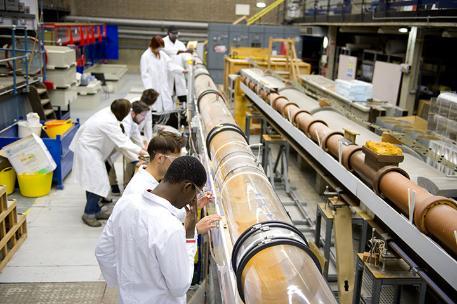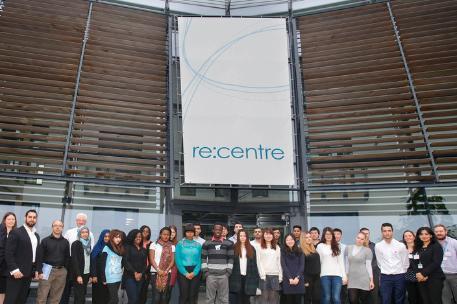Research partnerships and projects
From large scale Knowledge Transfer Partnerships to shorter projects, consultation and scientific analysis, we have a range of services that can have a significant impact on your processes and products to improve your business.
Our Business Development team are available to offer advice on how you can leverage our expertise and specialist facilities to develop and innovate in your business.
Contact us to discuss your needs and find the course of action that’s right for your organisation.
Our offer includes:
- Academic consultation – a potentially untapped resource of expert knowledge that could give your business the edge.
- Access to facilities, specialist equipment and technical knowledge – we can provide scientific analysis and lab space.
- Advice about sources of funding for your business development.
- Student projects – our talented students can gain industrial experience while engaged in a task that could benefit your business.
Why Bradford?
We are committed to applying our world class research to practical issues that make a difference in our local communities, as well as nationally and internationally. Our academic and research staff work within interdisciplinary research centres across our four faculties, the Faculty of Engineering and Digital Technologies, the Faculty of Health Studies, the Faculty of Life Sciences and the Faculty of Management, Law and Social Sciences:
Research specialisms
Our expertise includes the following areas:
- Accounting, Finance and Economics
- Advanced Materials Engineering – using polymers in medical and biomedical products
- Artificial Intelligence
- Visual Computing and Intelligent Systems
- Automotive Research
- Business Analytics, Circular Economy and Entrepreneurship
Contact us today
To discuss how our expertise can make a difference to your organisation, please get in touch with our Business Development team, complete our enquiry form or send us an email.
Knowledge Transfer Partnerships (KTPs)
A KTP project can help you improve your organisation’s productivity and performance to stay competitive by forming a partnership with us and accessing our skills and expertise. The University of Bradford has facilitated more than 80 KTPs and worked with a variety of small and large businesses such as Yorkshire Water, Bombay Stores and BAE Systems.
As a business, forming a long-term partnership with a University offers direct access to research expertise and graduate talent, embedding knowledge and research for long term benefit. KTPs, and the newer Management KTPs (link), focused on expanding management capability, are here to facilitate these relationships, matching the right businesses and institutions to work together and maximise the benefits for everyone. And those benefits are not just economic - a KTP delivers positive environmental and societal impact too.
How it works
The KTP is managed by a KTP Associate, a talented graduate or postgraduate recruited and employed by the university to work within the business. They are supported by a supervisor within your organisation and an academic supervisor from the University of Bradford whose supervision and input for a KTP is a minimum of half a day per week. There is also a Knowledge Transfer Adviser assigned to the project who will visit every 3 - 4 months to provide ongoing support, coaching and mentoring. The length of Knowledge Transfer Partnerships varies from 12 – 36 months, depending on the project and the requirements of your business.
Applying for a KTP
Funding
Part of the cost of a Knowledge Transfer Partnership is funded by a grant from Innovate UK or other government co-funders that you apply for in a competitive bid for submissions (there is a success rate for applications of around 90%). The remainder of the project cost is met through a cash payment by your organisation. Project costs are variable, but can typically be around £80,000 – £100,000 per project year. For Small and Medium-Sized Enterprises the grant rate is 67% of the project cost; for large companies 50%; and for third sector organisations the grant rate is 75%.
Eligibility
Businesses of any size and in any sector, including virtual UK-based businesses and third sector organisations, can apply for a KTP. To apply for a Knowledge Transfer Partnership companies should:
- Be UK registered and of sufficient size to support the project.
- Have the financial capacity to make the required contribution to the cost of running a Knowledge Transfer Partnership
- Be aware that Knowledge Transfer Partnerships can have a long-term legacy that can be measured over five years, as well as shorter term impact.
- Be able to show that their project demonstrates Impact, Innovation, Challenge and Cohesiveness
"At CustomLensAi our collaboration with the University of Bradford is a game-changer in personalised healthcare. Together, we’re pioneering AI-driven solutions that enhance surgical precision and patient outcomes, transforming the future of ophthalmology."
Mr. Milind Pande, Founder and CEO of CustomLensAi
Funding for business innovation
There are a number of different funding sources available for working with our academics and students. Our staff have valuable experience in submitting successful bids to these funding sources and would be happy to discuss which options are the most suitable for the type of work you would like us to support.
Innovate UK run funding competitions for UK-based business to enable the research and development of processes, products or services and supports the testing of innovation ideas and allows business to become more competitive. Businesses can compete for government backed funding between £25,000 and £10 million.
The UK Government’s Research and Development (R&D) Tax Relief supports companies that work on innovative projects in science and technology. It can be claimed by a range of companies that seek to research or develop an advance in their field. It can even be claimed on unsuccessful projects. You may be able to claim Corporation Tax relief if your project meets our definition of R&D. The work that qualifies for R&D relief must be part of a specific project to make an advance in science or technology.



-457x304.jpg)
